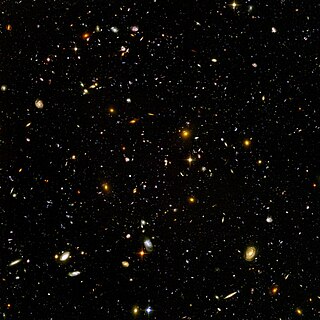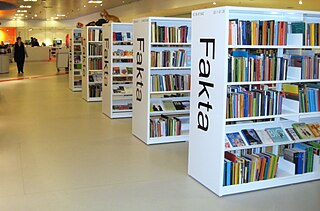
The world is the totality of entities, the whole of reality, or everything that exists. The nature of the world has been conceptualized differently in different fields. Some conceptions see the world as unique, while others talk of a "plurality of worlds". Some treat the world as one simple object, while others analyze the world as a complex made up of parts.

A fact is a true datum about one or more aspects of a circumstance. Standard reference works are often used to check facts. Scientific facts are verified by repeatable careful observation or measurement by experiments or other means.
In philosophical epistemology, there are two types of coherentism: the coherence theory of truth, and the coherence theory of justification.
In metaphysics, phenomenalism is the view that physical objects cannot justifiably be said to exist in themselves, but only as perceptual phenomena or sensory stimuli situated in time and in space. In particular, some forms of phenomenalism reduce all talk about physical objects in the external world to talk about bundles of sense data.
Modal logic is a kind of logic used to represent statements about necessity and possibility. It plays a major role in philosophy and related fields as a tool for understanding concepts such as knowledge, obligation, and causation. For instance, in epistemic modal logic, the formula can be used to represent the statement that is known. In deontic modal logic, that same formula can represent that is a moral obligation. Modal logic considers the inferences that modal statements give rise to. For instance, most epistemic modal logics treat the formula as a tautology, representing the principle that only true statements can count as knowledge. However, this formula is not a tautology in deontic modal logic, since what ought to be true can be false.

David Kellogg Lewis was an American philosopher. Lewis taught briefly at UCLA and then at Princeton University from 1970 until his death. He is closely associated with Australia, whose philosophical community he visited almost annually for more than 30 years.
Truthmaker theory is "the branch of metaphysics that explores the relationships between what is true and what exists". The basic intuition behind truthmaker theory is that truth depends on being. For example, a perceptual experience of a green tree may be said to be true because there actually is a green tree. But if there were no tree there, it would be false. So the experience by itself does not ensure its truth or falsehood, it depends on something else. Expressed more generally, truthmaker theory is the thesis that "the truth of truthbearers depends on the existence of truthmakers". A perceptual experience is the truthbearer in the example above. Various representational entities, like beliefs, thoughts or assertions can act as truthbearers. Truthmaker theorists are divided about what type of entity plays the role of truthmaker; popular candidates include states of affairs and tropes.
Counterfactual conditionals are conditional sentences which discuss what would have been true under different circumstances, e.g. "If Peter believed in ghosts, he would be afraid to be here." Counterfactuals are contrasted with indicatives, which are generally restricted to discussing open possibilities. Counterfactuals are characterized grammatically by their use of fake tense morphology, which some languages use in combination with other kinds of morphology including aspect and mood.
A possible world is a complete and consistent way the world is or could have been. Possible worlds are widely used as a formal device in logic, philosophy, and linguistics in order to provide a semantics for intensional and modal logic. Their metaphysical status has been a subject of controversy in philosophy, with modal realists such as David Lewis arguing that they are literally existing alternate realities, and others such as Robert Stalnaker arguing that they are not.
In analytic philosophy, actualism is the view that everything there is is actual. Another phrasing of the thesis is that the domain of unrestricted quantification ranges over all and only actual existents.
Modal realism is the view propounded by philosopher David Lewis that all possible worlds are real in the same way as is the actual world: they are "of a kind with this world of ours." It is based on four tenets: possible worlds exist, possible worlds are not different in kind from the actual world, possible worlds are irreducible entities, and the term actual in actual world is indexical, i.e. any subject can declare their world to be the actual one, much as they label the place they are "here" and the time they are "now".
In linguistics and philosophy, modality refers to the ways language can express various relationships to reality or truth. For instance, a modal expression may convey that something is likely, desirable, or permissible. Quintessential modal expressions include modal auxiliaries such as "could", "should", or "must"; modal adverbs such as "possibly" or "necessarily"; and modal adjectives such as "conceivable" or "probable". However, modal components have been identified in the meanings of countless natural language expressions, including counterfactuals, propositional attitudes, evidentials, habituals, and generics.
In philosophical logic, the concept of an impossible world is used to model certain phenomena that cannot be adequately handled using ordinary possible worlds. An impossible world, , is the same sort of thing as a possible world , except that it is in some sense "impossible." Depending on the context, this may mean that some contradictions, statements of the form are true at , or that the normal laws of logic, metaphysics, and mathematics, fail to hold at , or both. Impossible worlds are controversial objects in philosophy, logic, and semantics. They have been around since the advent of possible world semantics for modal logic, as well as world based semantics for non-classical logics, but have yet to find the ubiquitous acceptance, that their possible counterparts have found in all walks of philosophy.

Trivialism is the logical theory that all statements are true and, consequently, that all contradictions of the form "p and not p" are true. In accordance with this, a trivialist is a person who believes everything is true.
In philosophy, specifically in the area of metaphysics, counterpart theory is an alternative to standard (Kripkean) possible-worlds semantics for interpreting quantified modal logic. Counterpart theory still presupposes possible worlds, but differs in certain important respects from the Kripkean view. The form of the theory most commonly cited was developed by David Lewis, first in a paper and later in his book On the Plurality of Worlds.
Philosophy of logic is the area of philosophy that studies the scope and nature of logic. It investigates the philosophical problems raised by logic, such as the presuppositions often implicitly at work in theories of logic and in their application. This involves questions about how logic is to be defined and how different logical systems are connected to each other. It includes the study of the nature of the fundamental concepts used by logic and the relation of logic to other disciplines. According to a common characterisation, philosophical logic is the part of the philosophy of logic that studies the application of logical methods to philosophical problems, often in the form of extended logical systems like modal logic. But other theorists draw the distinction between the philosophy of logic and philosophical logic differently or not at all. Metalogic is closely related to the philosophy of logic as the discipline investigating the properties of formal logical systems, like consistency and completeness.
Modal fictionalism is a term used in philosophy, and more specifically in the metaphysics of modality, to describe the position that holds that modality can be analysed in terms of a fiction about possible worlds. The theory comes in two versions: Strong and Timid. Both positions were first exposed by Gideon Rosen starting from 1990.
Formal semantics is the study of grammatical meaning in natural languages using formal concepts from logic, mathematics and theoretical computer science. It is an interdisciplinary field, sometimes regarded as a subfield of both linguistics and philosophy of language. It provides accounts of what linguistic expressions mean and how their meanings are composed from the meanings of their parts. The enterprise of formal semantics can be thought of as that of reverse-engineering the semantic components of natural languages' grammars.
Extended modal realism is a metaphysical theory developed by Takashi Yagisawa. It concerns the question of what it means that something is possible or necessary. Modal realism is the view that besides the actual world, there are many possible worlds. They exist as alternate versions of the actual world we live in. It contrasts with actualism, which holds that there is only one world: the actual world. Extended modal realism is a special form of modal realism. It includes the controversial thesis that there are not just possible worlds but also impossible worlds. An impossible world is a world that contains a contradiction. Extended modal realism understands modality as a dimension similar to space and time. In this sense, a regular object, like a tree or a car, is not just extended in space and time but also across possible and impossible worlds: some parts of it exist in the actual world and other parts exist in non-actual worlds. There is only one universe encompassing everything that is real in the widest sense: the actual, the possible, and the impossible.
This is a glossary of logic. Logic is the study of the principles of valid reasoning and argumentation.




